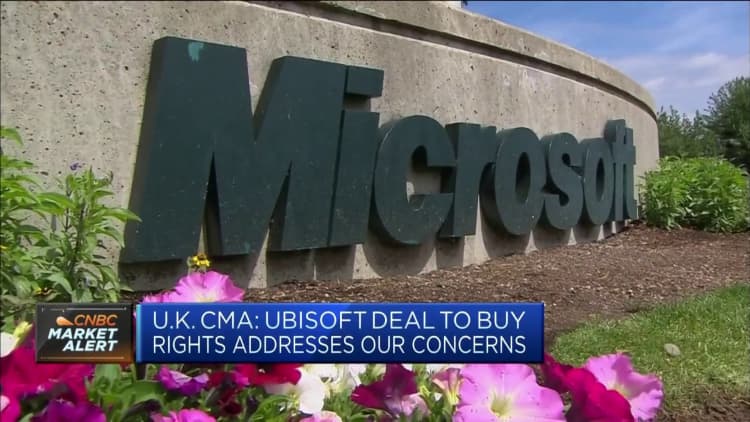

Britain’s top competition watchdog on Friday gave the green light to Microsoft’s proposed $69 billion takeover of gaming firm Activision Blizzard, removing the last major hurdle for the deal to close.
The Competition and Markets Authority said it had cleared the deal for Microsoft to buy Activision but without cloud gaming rights.
“The new deal will stop Microsoft from locking up competition in cloud gaming as this market takes off, preserving competitive prices and services for UK cloud gaming customers,” the regulator said in a statement Friday.
The CMA was the final regulator holding up the deal. Microsoft should now be able to close the acquisition.
The decision marks a major U-turn from the CMA, the staunchest critic of the takeover, which effectively blocked the deal earlier this year over concerns the acquisition would hamper competition in the nascent cloud gaming market.
Microsoft first proposed to acquire Activision in January 2022, but has since faced regulatory challenges in the U.S., Europe and the U.K.
In July, the CMA said it would consider a restructured acquisition from Microsoft to allay its concerns. Microsoft offered a spate of concessions, which centered around divesting the cloud rights of Activision games to French game publisher Ubisoft Entertainment.
“It will allow Ubisoft to offer Activision’s content under any business model, including through multigame subscription services. It will also help to ensure that cloud gaming providers will be able to use non-Windows operating systems for Activision content, reducing costs and increasing efficiency,” the CMA said.
The UK’s regulatory U-turn
Regulators globally were concerned that the takeover would reduce competition in the gaming market, in particular around cloud gaming. Microsoft could also take key Activision games like Call of Duty and make them exclusive to Xbox and other Microsoft platforms, the officials contended.
Cloud gaming is seen as the next industry frontier, offering subscription services that allow people to stream games just as they would movies or shows on Netflix. It could even remove the need for expensive consoles, with users playing the games on PCs, mobile and TVs instead.
Microsoft logo is seen on a smartphone placed on displayed Activision Blizzard logo in this illustration taken January 18, 2022.
Dado Ruvic | Reuters
Specifically, the U.K. regulator argued when it blocked the takeover in April that allowing the deal to go ahead would give Microsoft a strong position in the nascent cloud gaming market.
Authorities in the European Union were the first major regulator to clear the deal in May, after Microsoft offered concessions to the EU.
At the time, the CMA said it stood by its initial decision to block the transaction because the compromises presented to the EU would allow Microsoft to “set the terms and conditions for this market for the next ten years.”
Meanwhile, in the U.S., the Federal Trade Commission was fighting a legal battle with Microsoft in an effort to get the Activision takeover scrapped. In July, however, a judge blocked the FTC’s attempt to do so, clearing the way for the deal to go ahead in the U.S.
Just hours later, the CMA said it was “ready to consider any proposals from Microsoft to restructure the transaction” and allay the regulator’s concerns.
Microsoft concessions to the UK
In August, Microsoft offered concessions to the CMA in its second attempt to get the deal cleared.
Under the restructured transaction, Microsoft will not acquire cloud rights for existing Activision PC and console games, or for new games released by Activision during the next 15 years. Instead, these rights will be divested to Ubisoft Entertainment before Microsoft’s acquisition of Activision, according to the CMA.
“With the sale of Activision’s cloud streaming rights to Ubisoft, we’ve made sure Microsoft can’t have a stranglehold over this important and rapidly developing market,” Sarah Cardell, CEO of the CMA, said in a statement.
“As cloud gaming grows, this intervention will ensure people get more competitive prices, better services and more choice. We are the only competition agency globally to have delivered this outcome.”
While the U.K. approved the deal, the CMA, which has been growing increasingly aggressive in its actions to scrutinize big mergers, fired a parting shot at Microsoft in which it slammed the tech giant’s negotiation tactics.
“Businesses and their advisors should be in no doubt that the tactics employed by Microsoft are no way to engage with the CMA,” Cardell said.
“Microsoft had the chance to restructure during our initial investigation but instead continued to insist on a package of measures that we told them simply wouldn’t work. Dragging out proceedings in this way only wastes time and money.”
‘Final regulatory hurdle’
The CMA was the last major regulator holding up the Activision takeover.
Microsoft President Brad Smith said on X, formerly known as Twitter, that he is “grateful” for the CMA’s review and decision.
“We have now crossed the final regulatory hurdle to close this acquisition, which we believe will benefit players and the gaming industry worldwide,” Smith said.
Bobby Kotick, CEO of Activision Blizzard, told employees in an email that he is “excited for our next chapter together with Microsoft and the endless possibilities it creates for you and for our players.”
Throughout the regulatory scrutiny, Microsoft had been trying to show regulators and its closest competitors that it will not make games exclusive.
The U.S. tech giant signed a deal in February to bring Xbox games to Nvidia’s cloud gaming service and struck a 10-year deal to bring Call of Duty to Nintendo players on the same day as Xbox, “with full feature and content parity.” Microsoft also signed a deal in July with its biggest rival Sony to bring Call of Duty to the Japanese firm’s PlayStation gaming console.





